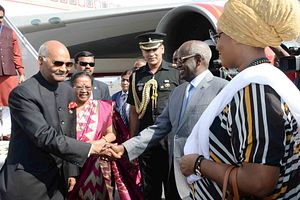Indian President Ram Nath Kovind is heading to Africa this week on his maiden visit as India’s president and New Delhi has chosen Djibouti and Ethiopia as his destinations. As the Ministry of External Affairs has pointed out “Africa is chosen as the first destination of president’s overseas visit — an indication of the importance attached to the African continent by the current government.” The Modi government has been keen on expanding its profile in Africa, a continent with which India has shared historic ties and one where major powers today are scrambling for influence.
Djibouti is emerging as a key state in the Indian Ocean region. The construction of the Djibouti naval base — China’s first military base abroad — has generated varied reactions around the world. The base is seen as a move pushing China’s own limits to its foreign policy, and underscores its growing security profile in Africa. This new military foray in Africa, as explained by Chinese Foreign Minister Wang Yi at a press conference in 2016, was part of China’s willingness to “play a constructive role in the political settlement of international and regional issues, so as to create a more secure and stable environment for China’s development overseas,” and to “take on more international security responsibilities.” Indeed, China’s growing military profile in Africa is following its economic footprint in the continent. It is moving towards an ever more expansive definition of its global interests, pushing New Delhi to create new mechanisms for securing those interests, including its own growing military footprint abroad.
Djibouti has been very welcoming of Indian presence in the country and had helped India during the time of evacuation from Yemen in 2015. With Ethiopia, India has had traditional ties and it remains the largest recipient of India’s concessional Lines of Credit in Africa. Both nations are key for India’s Africa outreach.
With the India-Africa summit in 2015, the Modi government had signaled its readiness to step up engagement with Africa, a relationship which is centuries old, bolstered by trade across the Indian Ocean and a million-strong diaspora across Africa. Shared colonial legacy and post-independence development experience have framed India’s relationship with Africa. India’s role as a champion of anti-colonialism and anti-racism after its independence in 1947 drew it closer to the African nations.
Since the end of the Cold War and propelled by China’s growing profile in Africa, India is re-invigorating its ties with the African continent. The cooperation framework agreed at past India-Africa summits and the Indian initiatives to scale up investment and aid to Africa have underscored India’s aim to foster a robust partnership between New Delhi and the African continent.
India today has growing stakes in Africa. With some of the fastest growing nations in the world, Africa of today is not the “dark continent” of yore. The needs of regional states are divergent and their strengths are varied. India’s focus over the last few decades has largely been on capacity building on the continent, providing more than $1 billion in technical assistance and training to personnel under the Indian Technical and Economic Cooperation (ITEC) program. India has committed $7.5 billion to African infrastructure, covering 137 projects in more than 40 countries. India has also offered duty-free market access to Africa’s least developed countries. But India’s trade with Africa remains far below potential.
India wants a “developmental partnership” with Africa to be the cornerstone of its economic ties with the region. This also allows India to differentiate itself from the principles on which countries belonging to the Organization for Economic Cooperation and Development (OECD), the traditional donors of foreign aid, have based their relations with the recipient nations.
Beijing’s policy of using financial and military aid to secure oilfields in Africa has resulted in New Delhi losing out. The fierce competition between China and India for resources and energy to fuel their economies has been likened to the so-called scramble for Africa among European countries in the 19th century. This is a competition only in name as India lags far behind China in Africa. Where China’s response toward the region has been well-coordinated across various government agencies, India has failed to project a united front. The Indian government will have to support its companies more proactively if it hopes to close the gap with China in terms of its economic profile on the continent.
Yet India has its own strengths in its dealings with Africa. Its democratic traditions make it a much more comfortable partner for the West compared to China in cooperating on Africa- related issues. India is viewed as a more productive partner by many in Africa because Indian companies are much better integrated into the African society and encourage technology transfers to its African partners. New Delhi will have to leverage its own strengths in making a lasting compact with Africa and regain its lost presence on the continent.
President Kovind’s visit underlines the continuing salience of Africa in India’s foreign policy matrix and the resolve of New Delhi to build long-term partnerships with the African continent.

































